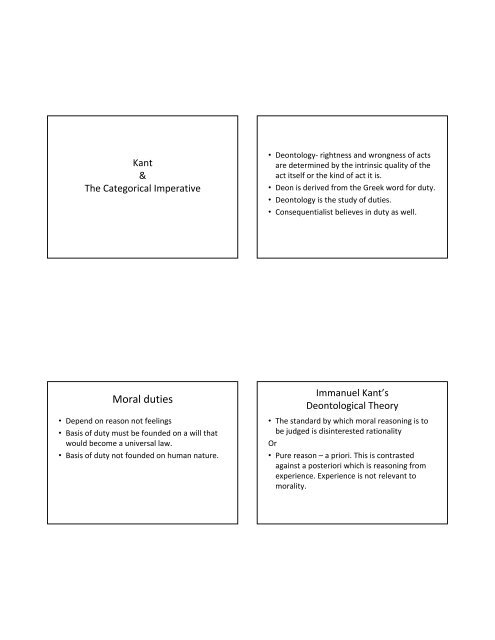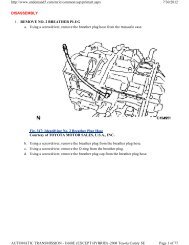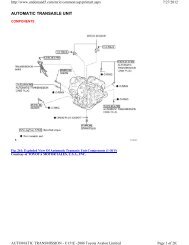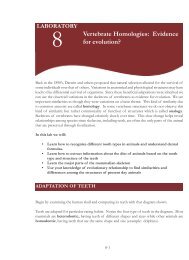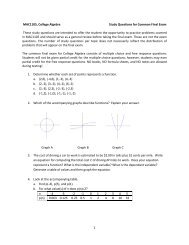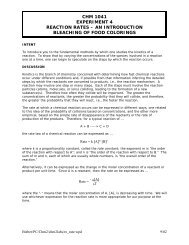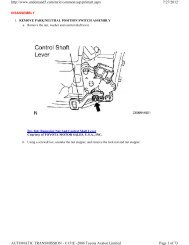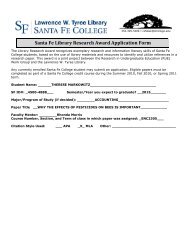Kant and the Categorical Imperative
Kant and the Categorical Imperative
Kant and the Categorical Imperative
Create successful ePaper yourself
Turn your PDF publications into a flip-book with our unique Google optimized e-Paper software.
<strong>Kant</strong><br />
&<br />
The <strong>Categorical</strong> <strong>Imperative</strong><br />
Moral duties<br />
• Depend on reason not feelings<br />
• Basis of duty must be founded on a will that<br />
would become a universal law.<br />
• Basis of duty not founded on human nature.<br />
• Deontology‐ rightness <strong>and</strong> wrongness of acts<br />
are determined by <strong>the</strong> intrinsic quality of <strong>the</strong><br />
act itself or <strong>the</strong> kind of act it is.<br />
• Deon is derived from <strong>the</strong> Greek word for duty.<br />
• Deontology is <strong>the</strong> study of duties.<br />
• Consequentialist believes in duty as well.<br />
Immanuel <strong>Kant</strong>’s<br />
Deontological Theory<br />
• The st<strong>and</strong>ard by which moral reasoning is to<br />
be judged is disinterested rationality<br />
Or<br />
• Pure reason –a priori. This is contrasted<br />
against a posteriori which is reasoning from<br />
experience. Experience is not relevant to<br />
morality.
Pure Reason<br />
• Divorced from reality<br />
• Cannot include self‐interest<br />
• The sight of a being who is not adorned with a<br />
single feature of a pure <strong>and</strong> good will,<br />
enjoying unbroken prosperity, can never give<br />
pleasure to an impartial spectator.<br />
Good<br />
• The supreme good is having a good will.<br />
• This is good without qualification.<br />
• A good will is an absolute value.<br />
• Mental abilities can be misused if no good<br />
will.<br />
• Character without good will is bad.<br />
• Happiness without a good will is bad<br />
Pure Reason Guides <strong>the</strong> Will<br />
• Reason was made to guide <strong>the</strong> will<br />
• If reason made by nature for practical ends it<br />
would have been better for nature to have<br />
prescribed instinct.<br />
• The more a man applies reason to happiness<br />
<strong>the</strong> more he finds himself unable to achieve.<br />
• The above gives rise to a hatred of reason.
Argument<br />
• 1. As reason is not competent to guide <strong>the</strong> will with certainty<br />
in regard to its objects <strong>and</strong> <strong>the</strong> satisfaction of all our wants<br />
(which it to some extent even multiplies.<br />
• 2. An implanted instinct would do better for this end.<br />
• 3. Reason is imparted to us as a practical faculty. (to have<br />
influence over <strong>the</strong> will)<br />
• 4. Nature adapts <strong>the</strong> means to <strong>the</strong> ends.<br />
• Therefore, reasons true destination must be to produce a will,<br />
not merely as a means to something else, but good in itself –<br />
reason was necessary for this.<br />
Propositions of Morality<br />
• 1. An action must be done from duty, if it is to have<br />
moral worth.<br />
• 2. An action done from duty derives its moral worth,<br />
not from <strong>the</strong> purpose which is to be attained by it,<br />
but from <strong>the</strong> maxim by which it is determined.<br />
Therefore it does not depend on <strong>the</strong> realization of<br />
<strong>the</strong> object, but merely on <strong>the</strong> Principle of Volition.<br />
• 3. Therefore, duty is <strong>the</strong> necessity of acting from<br />
respect for <strong>the</strong> law.<br />
Implication<br />
• Motivation to do <strong>the</strong> right thing is stronger<br />
than our interests to fulfill our own,<br />
individual, interests.<br />
• From <strong>the</strong>se propositions which are found by<br />
<strong>the</strong> application of pure reason we now know<br />
• The pre‐eminent good which we call moral is<br />
nothing else than <strong>the</strong> conception of law itself,<br />
which is possible only in a rational being.
The St<strong>and</strong>ard<br />
• Having a good will.<br />
• Having a good will is having good intentions.<br />
• One is acting on <strong>the</strong> basis of having good<br />
intentions when one’s acts are performed<br />
from duty.<br />
Hypo<strong>the</strong>tical <strong>Imperative</strong>s<br />
• These always have <strong>the</strong> characteristic of being<br />
self‐interested.<br />
• These are never categorical in nature.<br />
• Ex. When I want to lose weight, I will exercise<br />
<strong>and</strong> conform to a diet.<br />
• OR, If I want to have friends, I will act in a<br />
friendly manner to everyone I meet.<br />
Two Types of <strong>Imperative</strong>s<br />
• Hypo<strong>the</strong>tical <strong>Imperative</strong>s<br />
• <strong>Categorical</strong> <strong>Imperative</strong>s<br />
<strong>Categorical</strong> <strong>Imperative</strong>s<br />
• <strong>Kant</strong>’s means to attain disinterested moral<br />
reasoning.<br />
• It is categorical since it pertains to all rational<br />
beings.<br />
• It is what all rational beings will follow.
The <strong>Categorical</strong> <strong>Imperative</strong><br />
• Act only on that maxim which you can at <strong>the</strong><br />
same time will to be a universal law of nature.<br />
Or<br />
• Always act in such a way that <strong>the</strong> maxim of<br />
my act can be willed (by me) to be a universal<br />
law of nature.<br />
<strong>Kant</strong>’s method of attaining<br />
universalizability<br />
1. Determine <strong>the</strong> maxim of <strong>the</strong> action under<br />
consideration.<br />
2. Form <strong>the</strong> hypo<strong>the</strong>tical imperative for <strong>the</strong> maxim.<br />
3. Form <strong>the</strong> generalized maxim.<br />
4. Form <strong>the</strong> generalized contrary maxim.<br />
5. Test both generalized maxim <strong>and</strong> its contrary for<br />
consistency.<br />
6. Select <strong>the</strong> action which which meets <strong>the</strong><br />
consistency test, this is <strong>the</strong> morally right thing to<br />
do.<br />
Maxims<br />
Definition‐ a maxim is a general principle of<br />
action.<br />
• Types<br />
– Hypo<strong>the</strong>tical – individual’s general principle of<br />
action to attain a self‐interested end.<br />
– <strong>Categorical</strong> – generalized/universal principle of<br />
action followed by any <strong>and</strong> all rational beings.<br />
Consistency Test<br />
• Consistency in conception<br />
– Conceptual consistency<br />
• Would this imperative involve a self‐contradicting<br />
concept?<br />
– Logical consistency<br />
• Does this imperative contradict itself?<br />
• Consistency in will<br />
– Would I want this imperative to apply to me?
Example: Lie<br />
• I have a friend <strong>and</strong> she asks me whe<strong>the</strong>r she looks<br />
nice.<br />
• I don’t think she does. And I think I should lie to her<br />
about her appearance. Why?<br />
• Act: lie.<br />
• Hypo<strong>the</strong>tical Maxim: When asked for my opinion, lie.<br />
• Generalized maxim: Whenever anyone is asked for<br />
<strong>the</strong>ir opinion, <strong>the</strong>y will lie.<br />
• Generalized contrary maxim: Whenever anyone is<br />
asked for <strong>the</strong>ir opinion, <strong>the</strong>y will tell <strong>the</strong> truth.<br />
General Form of Application<br />
• Determine <strong>the</strong> act to be performed.<br />
• Convert <strong>the</strong> act into a maxim.<br />
• Form <strong>the</strong> contrary maxim.<br />
• Form <strong>the</strong> generalized maxim <strong>and</strong> its contrary.<br />
• Test for consistency in conception <strong>and</strong> will.<br />
Testing for Consistency<br />
• Is <strong>the</strong> generalized maxim consistent in conception?<br />
• No!<br />
• Why?<br />
• Would anyone know <strong>the</strong> truth?<br />
• So we don’t need to test for consistency in will.<br />
• But what about <strong>the</strong> generalized contrary maxim?<br />
• It’s consistent in conception.<br />
• What about will? Would I want to know <strong>the</strong> truth?<br />
• <strong>Kant</strong> maintains that all rational beings would.<br />
Example 2: Helping o<strong>the</strong>rs.<br />
• Driving down a lonely country road <strong>and</strong> see a<br />
motorist str<strong>and</strong>ed on <strong>the</strong> highway.<br />
• Should I stop <strong>and</strong> help this person?<br />
• What is <strong>the</strong> act?<br />
• Helping ano<strong>the</strong>r fellow rational being.<br />
• What is <strong>the</strong> maxim for this act?<br />
• If I can help ano<strong>the</strong>r, <strong>the</strong>n I will help <strong>the</strong>m.
What test is failed?<br />
• Both generalized maxims are consistent in<br />
conception.<br />
• But could I will that no one help me if I<br />
needed help?<br />
• Perfect<br />
• Imperfect<br />
Types of Duties<br />
Good Will<br />
• Having a good will is acting from duty.<br />
Altruism<br />
• Def –a disinterested benevolence <strong>and</strong><br />
unselfish concern for <strong>the</strong> welfare of o<strong>the</strong>rs<br />
• Or –<br />
• That aspect of a moral <strong>the</strong>ory that states that<br />
o<strong>the</strong>rs are to be <strong>the</strong> primary beneficiaries of<br />
one’s acts.<br />
• Or –Actions that are performed solely for<br />
benefit to o<strong>the</strong>rs, acting unselfishly.
Respect for Persons<br />
• Never use anybody as a means to an end, but<br />
ra<strong>the</strong>r treat everyone as an end in him/her‐<br />
self


